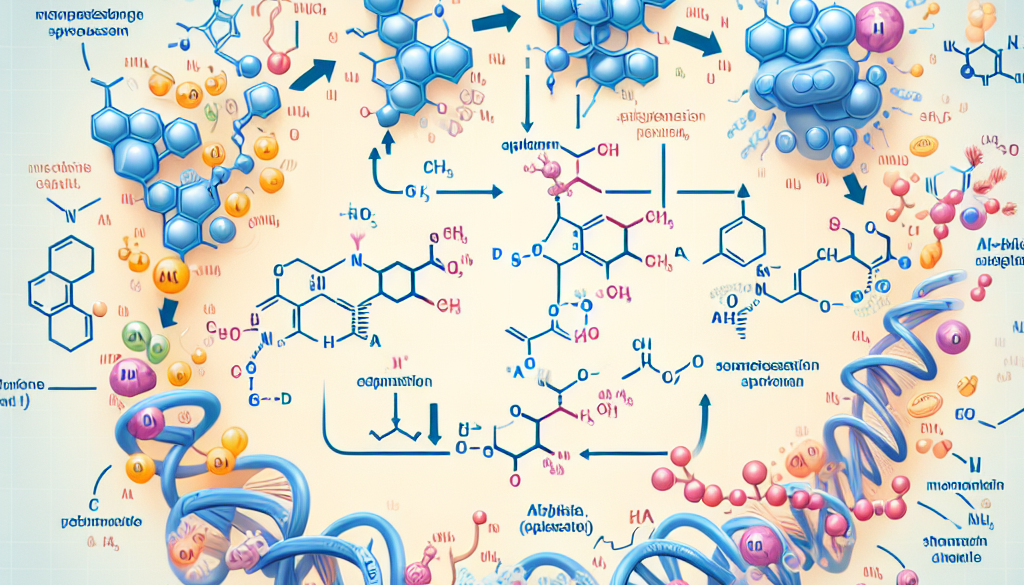α-Ketoglutarate’s Role in Tumor Suppression Pathways
-
Table of Contents
α-Ketoglutarate’s Role in Tumor Suppression Pathways
α-Ketoglutarate (α-KG) is a pivotal molecule in cellular metabolism and signaling, playing a crucial role in various biological processes including the regulation of cellular energy, redox state, and epigenetic modifications. Recent research has highlighted its potential in tumor suppression, making it a focal point in the study of cancer metabolism. This article delves into the mechanisms through which α-KG contributes to tumor suppression and the implications for cancer therapy.
Understanding α-Ketoglutarate
α-Ketoglutarate is a key intermediate in the Krebs cycle, also known as the citric acid cycle, which is vital for aerobic energy production in mitochondria. Beyond its metabolic role, α-KG serves as a substrate for dioxygenases, including prolyl hydroxylases, which regulate the hypoxia-inducible factor (HIF) pathway, and histone and DNA demethylases, which influence gene expression and DNA repair.
α-Ketoglutarate in Cancer Metabolism
Cancer cells often exhibit altered metabolism, which includes changes in the Krebs cycle and cellular redox state. α-KG, at the juncture of these pathways, influences several aspects of cancer cell behavior:
- Modulation of Hypoxia-Inducible Factors: α-KG-dependent dioxygenases require α-KG for the degradation of HIF-1α, a transcription factor that promotes angiogenesis and metabolic reprogramming in tumors.
- Epigenetic Regulation: It acts as a cofactor for dioxygenases involved in the demethylation of histones and DNA, thereby affecting gene expression patterns crucial for tumor growth and metastasis.
- Redox Homeostasis: As part of the Krebs cycle, α-KG helps maintain cellular redox balance, which is often disrupted in cancer cells.
α-Ketoglutarate’s Direct Impact on Tumor Suppression
Research has shown that α-KG can suppress tumor growth through various pathways:
- Inhibition of Oncogenic Signaling: α-KG derivatives have been found to inhibit mTOR signaling, a pathway often upregulated in cancer cells.
- Stimulation of Tumor Suppressor Proteins: α-KG enhances the activity of tumor suppressor proteins such as p53, which plays a critical role in controlling cell cycle and apoptosis.
- Induction of Differentiation: In certain cancer types, α-KG has been shown to promote differentiation, thereby reducing the aggressiveness and proliferation of cancer cells.
Therapeutic Potential of α-Ketoglutarate
The multifaceted role of α-KG in tumor suppression opens up new avenues for cancer therapy:
- Targeted Therapy: Developing drugs that mimic or enhance the tumor-suppressive effects of α-KG could provide a targeted approach to treat specific types of cancer.
- Dietary Supplements: Dietary supplementation with α-KG precursors or derivatives might help in managing cancer or enhancing the efficacy of existing therapies.
- Combination Therapy: α-KG could be used in combination with other therapies to exploit its role in redox balance and epigenetic regulation to improve treatment outcomes.
Challenges and Future Directions
While the potential of α-KG in cancer therapy is promising, several challenges need to be addressed:
- Selectivity: The effects of α-KG are not limited to cancer cells, and its impact on normal cells must be carefully studied.
- Delivery Mechanisms: Effective delivery of α-KG or its derivatives to tumor sites remains a significant hurdle.
- Clinical Trials: More extensive clinical trials are necessary to validate the efficacy and safety of α-KG-based therapies.
Conclusion
The role of α-Ketoglutarate in tumor suppression pathways offers a promising yet complex avenue for cancer research and treatment. Its involvement in crucial metabolic and epigenetic processes in cancer cells provides multiple targets for therapeutic intervention. However, realizing the full potential of α-KG in oncology requires overcoming significant challenges in drug development and delivery.
Explore ETprotein’s Protein Products
In light of the importance of proteins in health and disease management, ETprotein offers a range of high-quality protein products that can be integral to nutritional strategies in various conditions, including cancer. Their products, such as organic rice protein and pea protein, are excellent supplements for enhancing overall health and supporting metabolic functions.
ETprotein is α-Ketoglutarate Factory Manufacturer and Supplier in China, Check further information by visiting the α-Ketoglutarate Product Page
Request Quotation and Samples of α-Ketoglutarate from ETprotein
About ETprotein
ETprotein, a reputable protein and elite nutrition ingredients α-Ketoglutarate Chinese factory manufacturer and supplier, is renowned for producing, stocking, exporting, and delivering the highest quality organic bulk vegan proteins and elite nutritional ingredients α-Ketoglutarate. They include Organic rice protein, clear rice protein, pea protein, clear pea protein, watermelon seed protein, pumpkin seed protein, sunflower seed protein, mung bean protein, peanut protein. Their offerings, characterized by a neutral taste, non-GMO, allergen-free attributes, cater to a diverse range of industries. They serve nutraceutical, pharmaceutical, cosmeceutical, veterinary, as well as food and beverage finished product distributors, traders, and manufacturers across Europe, USA, Canada, Australia, Thailand, Japan, Korea, Brazil, and Chile, among others.
ETprotein specialization includes exporting and delivering tailor-made protein powder and finished nutritional supplements. Their extensive product range covers sectors like Food and Beverage, Sports Nutrition, Weight Management, Dietary Supplements, Health and Wellness Products, and Infant Formula, ensuring comprehensive solutions to meet all your protein needs.
As a trusted company by leading global food and beverage brands and Fortune 500 companies, ETprotein reinforces China’s reputation in the global arena. For more information or to sample their products, please contact them and email sales(at)ETprotein.com today.












